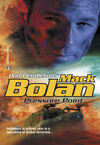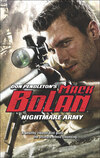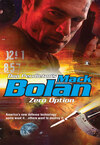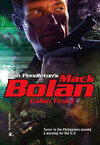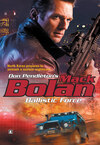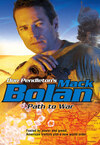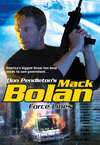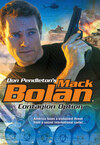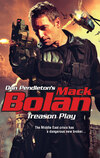Читать книгу: «Pressure Point», страница 4
CHAPTER NINE
“No wonder I put him out of commission so fast,” Jayne Bahn said, crouching over the Lashkar Jihad warrior she’d felled. The man, it turned out, had been shot twice prior to being caught up in the landslide, which had broken his right leg in at least two places. “I can’t believe he was able to get up and take a swipe at me with that knife of his.”
“Adrenaline,” Kissinger surmised.
“I say we put the squeeze on him till he coughs up Jahf-Al,” Bahn said.
“He’s in no shape to talk right now,” Bolan said, inspecting the man’s wounds. “With the blood he’s lost, even if he comes to, he’s going to be in shock.”
“Well, excuse me for sounding like a hard-ass,” Bahn countered, “but we’re more likely to get something useful out of him if he’s in shock than when he’s thinking straight.”
“We won’t get anything out of him if he dies on us,” Bolan stated. “We need to patch him up and get him to a hospital.”
“Let me know which one so I can send flowers,” Bahn replied sarcastically. “Maybe I’ll come by and fluff his pillows, too.”
“Listen, sweetheart,” Kissinger interrupted. “When the time’s right, we’ll get him to talk, don’t worry. And you can bet your ass we won’t do it by pampering him. Got that?”
“Temper, temper,” Bahn replied with a shrug. “Fine, have it your way.”
Kissinger glowered at the woman, then jogged over to the chopper for a stretcher and Mochtar’s med-kit. By the time they returned, Bolan had managed to staunch the flow of blood from the prisoner’s wounds. Kissinger daubed the wounds with antiseptic, then quickly dressed them and kept pressure on the bandages as Bolan helped the soldiers load the man onto the stretcher. Grimaldi was waiting to help haul him up into the chopper.
“Go ahead and get these people to the base,” Bolan told him. “We’ll finish up here.”
Grimaldi nodded. “I’ll swing back later with reinforcements and some kind of morgue unit for all the bodies.”
“Before you go, hand me a couple two-ways,” Bolan said.
Grimaldi reached into a bin near the door and pulled out two high-powered two-way radios. “Good luck,” he said, handing them to Bolan.
The soldier nodded, then called past Grimaldi to Raki Mochtar. “You did good work, Rock.”
“Thanks,” the younger man replied gratefully.
“We’ll see you back in Samarinda.” Bolan saluted the medic, then stepped back from the chopper.
Grimaldi got back behind the controls and lifted off, then drifted back out over the valley. Bolan turned back to the roadway and sized up the situation.
“The truck’s not going anywhere,” he said, eyeing the bombed-out vehicle. “I say we leave it for now and spread out.” He handed Kissinger one of the radios, telling him, “I want to check out the compound. Why don’t you and Latek secure the area, then check around for more survivors.”
“Done,” Kissinger said, taking the two-way Bolan held out to him. “What about our friend here?”
“I’ll take Ms. Bahn with me,” Bolan said.
“Not so fast,” Bahn said. “No offense, but I didn’t sign up for a tour of duty here, okay? I call my own shots.”
Bolan sighed. “Fair enough.” He grabbed a stray assault rifle lying on the ground and held it out to the woman. “I could use your help, if you don’t mind.”
“That’s more like it,” Bahn said, taking the weapon.
Bolan exchanged a quick glance with Kissinger, who rolled his eyes, then gestured to Latek and the other commandos. They began to fan out in separate directions, giving a wide berth to the Bio-Tain truck, which continued to leak faintly visible clouds of toxic gas. Bolan, meanwhile, led Bahn the other way, up the road leading to the agricultural compound.
By now the Black Hawk was beyond earshot and the road was eerily quiet. For the first time since the firefight had begun, Bolan noticed a few signs of wildlife: birds, a few small gray squirrels, and a thin black monkey scrambling back and forth along the guardrail.
“I think you can take off that mask now,” Bahn told Bolan. “It’s not like we’re trapped in some kind of enclosed space.”
Bolan took off his mask. There was a faint odor of cordite in the air and he could smell smoke from the fires across the valley, but there was nothing that smelled like the chemical stench of the cloud that had nearly enveloped him a short time ago. Bolan also realized his cough had left him, as had the stinging sensation in his eyes. He’d gotten off lucky, he figured.
They walked silently for a short distance, then Bolan asked, “Are you here on your own or still working for Inter-Trieve?”
“I-T,” she replied.
Inter-Trieve was a Washington, D.C.-based bounty agency specializing in high-profile cases involving international fugitives. Bahn had joined them five years ago after stints with the Army Rangers and CIA.
“We’re on retainer with the insurance company representing that cruise liner Jahf-Al deep-sixed last spring,” she explained. “They figure the reward money’ll help offset the claims they’re paying out.”
“Provided you bring him in,” Bolan said.
“I’ll bring him in, all right.”
“You seem pretty sure of yourself.”
“Gotta be in this line of work,” Bahn responded calmly.
“I take it you’re aware that half the free world’s tried tracking down Jahf-Al with no luck.”
“Well, maybe they didn’t try hard enough,” Bahn suggested.
Bolan wasn’t about to waste his breath arguing with her. Instead, he asked the woman how she knew about the raid. Bahn shrugged, swatting away a cloud of gnats that had appeared on the roadway.
“I have my sources,” she said.
“You think you could you be a little more specific?” Bolan asked.
“Sorry,” Bahn said. “A girl needs her secrets.”
“I’m just trying to figure out who tipped off these guys that we were coming.”
“Don’t look at me,” Bahn replied icily.
“I’m not accusing you.”
“Yeah, right.”
Once Bolan and Bahn had hiked around the next bend, the road came to a sudden end and they found themselves at the entrance to the seventy-acre IMA facility. The grounds were enclosed by an eight-foot-high cyclone fence, and the entrance gate was guarded by two uniformed men in their early twenties. The men had their carbines aimed at the new arrivals, and the guns quivered slightly in their hands. They’d obviously heard the earlier assault and seemed fearful of being dragged into the bloodshed. One of them shouted a warning in his native tongue.
“I seem to remember you speak a few languages,” Bolan murmured.
“So that’s why you wanted me to tag along, you little weasel,” Bahn taunted. “And here I thought you were after my body.”
Bolan suppressed a smile. “Business before pleasure,” he responded evenly.
Bahn called out to the guards in Bahasa Indonesian, then quickly explained what had happened back on the roadway. Once she’d finished, the men conferred briefly, then one of them raised the security bar while the other waved them past.
“That was easy enough,” Bahn whispered to Bolan. “Hell, no wonder the Lashkar had such an easy time of it.”
“Ask them how many men were on the Bio-Tain truck when it first showed up,” Bolan suggested.
The bounty hunter stopped alongside the raised bar and spoke again to the guards. Afterward, she and Bolan continued up the driveway, heading toward the storage facility, a two-story building set back a hundred yards from the gate.
“They say there were only six men on the truck,” Bahn reported, “and that includes the driver.”
“There were at least four times that many in on the ambush,” Bolan recalled.
“I know,” Bahn said. “I mentioned that, but they insist they inspected the truck coming and going and there were only six of them.”
“Then there must be a camp around here somewhere,” Bolan theorized.
“That’d be my guess, too,” Bahn said, staring past the grounds, where hazy ribbons of smoke stretched over a vast sprawl of rain forest.
As they continued up the drive, Bolan abruptly changed the subject. “Are you still on speaking terms with your ex-husband?”
Bahn was taken aback. “Excuse me?”
“Frank Dominico, right? Works CIA out of Africa.”
“I know who my ex-husband is, okay?” she retorted. “Why’d you bring him up?”
“You found out about the raid from him,” Bolan guessed.
“I already told you, my sources are confidential.”
“One phone call and I can find out for myself,” Bolan told her.
“All right,” Bahn said, sighing. “Yes, I got it from Frank. Last time we talked, I asked him where Jahf-Al might go after he snuck out of Afghanistan, and he turned me on to the whole FAO stink over the agri-compound here. It sounded like a decent lead, so I flew in a couple of days ago and started sniffing around. I got my hands on a map and figured a way to reach the compound without being seen.”
“Who’d you get the map from?” Bolan asked.
“Don’t push your luck, pal.” She sidestepped the question and pointed to her right as she went on, “I made it as far as the fence over there when I heard all hell breaking loose on the road. By the time I’d high-tailed it up over the mountain, the shooting had stopped and you guys had pretty much wrapped things up.”
“You didn’t really think you were going to find Jahf-Al here, did you?” Bolan asked.
“No,” Bahn admitted, “but I was going to plant a homing device on that truck of his and see if it would take me to him. Which is probably what you guys should’ve tried instead of trying to play John Wayne.”
“Hindsight,” Bolan said.
There were another two guards posted near the front entrance to the storage facility. As Bahn spoke to them, Bolan looked over the building. It was old and decrepit, the walls overrun with vines and the roof patched in several places with thin sheets of blue plastic. Hardly an ideal environment for storing toxic materials, he thought. There was no way he or Bahn were going to attempt to go inside the building without full HAZMAT gear.
“Okay,” Bahn said when she rejoined him. “They said the Bio-Tain crew showed up earlier than scheduled this morning and everything was routine until about an hour ago, when the driver got a call from somebody on his cab radio.”
“The tip-off,” Bolan guessed.
“Probably,” Bahn said. “Anyway, the crew stopped what it was doing and everybody piled back into the truck. The driver said something about an emergency, then drove off.”
“That’s it?”
“Not quite,” Bahn said. “Before they pulled out, apparently one of the workers kept looking up at that hilltop over there. It’s a good hundred yards from where I was hiking, so they weren’t looking at me.”
Bolan glanced up at the hill, half-hidden in shadow. The hill was covered with dense brush and dotted with small trees. Up near the crest was a rock formation that looked vaguely like a raised fist. Bolan told Bahn that KOPASSUS had stationed a surveillance team somewhere in the hills overlooking the compound, adding, “They said they were having trouble seeing the compound because of all the smoke.”
Bahn frowned and shook her head. “It was a little hazy up here, yeah, but not that bad. None of the guards mentioned that, either.”
Bolan pondered the discrepancy a moment, then got on the two-way radio to Kissinger. Cowboy reported that they’d come up empty-handed in terms of looking for other survivors. Bolan wasn’t surprised. He quickly briefed Kissinger on what he had found out, then asked to speak to Umar Latek. Once he had the sergeant on the line, Bolan asked him to think back to the call he’d made to the surveillance team.
“How clear was the reception?” he asked. “Could you tell for sure who you were talking to?”
There was a moment’s hesitation, then Latek replied, “There was some static, yes, but I am sure it was the head of the surveillance team.”
“Are you positive?” Bolan asked. “One hundred percent certain?”
Again Latek hesitated a moment. “It had to be him,” he said finally. “Who else could it have been?”
“I’m thinking the stakeout crew was jumped,” Bolan told him. “I think they were killed, and when you called, I think they squelched the frequency just enough to help mask the voice of whoever told you about the smoke making it hard to see the truck. They were covering, because the truck was already on the way, and they wanted to make sure it would take us by surprise.”
Yet again it took Latek a moment to respond. When he did, his voice was weary. “If that is the case, I am to blame for the ambush,” he told Bolan. “I should have suspected something was wrong.”
Bolan tried to assure the sergeant that if his suspicions were correct, Latek’s mistake had been an honest one. But Latek was inconsolable. He continued to berate himself until Bolan finally interjected, asking the sergeant to put Kissinger back on. He told Cowboy to stay put until Grimaldi returned or sent back another chopper.
“And keep an eye on Latek,” he concluded. “Poor guy sounds like he’s ready to commit hara-kiri.”
“I’ll try talking to him,” Kissinger said. “What’s your plan?”
“I want to find out what happened to that surveillance team,” Bolan said, staring up at the rock formation atop the hillock. “Then we’re going to start looking around for the hole our ambushers crawled out of.”
CHAPTER TEN
When asked about possible routes to the top of the hill, the IMA guards directed Bolan to a series of switch-backs leading from a rear entrance to the storage facility. The crisscrossed paths twisted their way around tall patches of wild grass, brambly thickets and scattered stands of gnarled trees. As Bolan and Bahn made their way up the incline, they could see, off to their right, the distant mountains of central Borneo. The peaks, some of them nearly ten thousand feet high, were barely visible through the smoky haze, which by now had stretched itself across the entire length of the valley rain forest.
Soon they came upon a firebreak, a thirty-yard-wide band of land hacked clear of brush and vegetation. It ran perpendicular to the switchbacks and stretched in both directions for as far as Bolan could see.
“We take a left here, right?” he said, trying to recall the directions the guards had given them.
Bahn nodded. “Yeah, we follow this for about two hundred yards, then there’s supposed to be another trail that leads up to the peak.”
The firebreak was on a slope but the ground was soft, making it easy to walk. There were no signs of boot prints, fresh or otherwise. The break was within plain sight of the storage facility, and there was no way anyone could have used it without being spotted.
“Assuming Jahf-Al’s here in Indonesia,” Bahn said, changing the subject, “what do you think his agenda is? Other than hiding out, I mean.”
Bolan shrugged. “The UIF already has a toehold here. If he can tap into the Muslim unrest, Indonesia’s got the makings of a great power base.”
“True,” Bahn said, “but the Lashkar Jihad’s already pretty much cornered the market on the extremist action. I know they’ve cut some kind of deal with the UIF, but I don’t think stepping aside and letting Jahf-Al run things was part of it. He and Pohtoh aren’t exactly buddy-buddy from what I understand.”
“That’s the way I hear it, too,” Bolan said.
Moamar Pohtoh was the Muslim firebrand who’d risen to head of the Lashkar Jihad after his predecessor, Halim Alwyi, had been gunned down in a Sulawesi shootout over a year ago. It was Pohtoh who’d widened the group’s agenda while at the same time consolidating power by killing off a number of Alwyi’s top-ranking subordinates. Pohtoh was no stranger to Jahf-Al, either, and there was supposedly bad blood between the two men dating back to the late 1990s, when they’d trained together at an al-Qaeda terrorist camp in the Afghanistan mountains of Tora Bora. Pohtoh, who hailed from the slums of Jakarta, was purportedly as suspicious of Jahf-Al’s bourgeois Cairo upbringing as he was of the Egyptian’s motivation for creating the United Islamic Front. The Indonesian strongman had gone on record as little as six months ago claiming that Jahf-Al was less interested in the cause of Islam than that of amassing power and trying to rival the infamy of Osama bin Laden. Given the antipathy between the two men, many had been surprised when it had come out that the Lashkar Jihad was accepting input from the UIF.
“Must be a strange bedfellows thing,” Bolan guessed. “They probably figured they had more to gain by focusing on common ground instead of haggling over their differences.”
“Wouldn’t be the first time that’s happened,” Bahn conceded.
By now they’d followed the firebreak nearly a hundred yards. Suddenly Bolan stopped and held out a hand, signaling for Bahn to do the same. She heard it, too: a rustling in the brush to their right. In unison, they both dropped to a crouch and raised their assault rifles, aiming into the foliage. The sound continued, growing louder and moving closer. Finally they could begin to make out the shadowy outline of three figures moving through the brush toward them.
“I’ve got the one in front,” Bahn whispered, nestling her finger against the trigger. “I say we don’t give them the first shot.”
Bolan shifted his aim toward the rear figures, then stopped and whispered back, “Hold your fire.”
“Look, maybe you’ve got a vest on under that suit of yours, but I don’t,” Bahn told him. “I’m not going to just wait here like some sitting duck for them to—”
“They’re monkeys,” Bolan stated.
“Call them what you like, I—”
“Orangutans,” Bolan said. “They’re orangutans.”
“What?” Bahn said, not willing to let down her guard.
But as she took a closer look into the brush, she realized Bolan was right. Three orangutans, all immature males, loped downhill a few more yards, then peered out through the branches. Bahn lowered her rifle and slowly stood, shaking her head.
“Makes sense,” she said. “I saw a preserve marked out on the map. Somewhere down there in the rain forest.”
The orangutans continued to stare at Bolan and Bahn but made no move to show themselves any further.
“Scram!” Bahn snapped at them. “We’re busy here!”
“Let’s just leave them alone,” Bolan said. He turned his back to the creatures and resumed hiking along the firebreak. Bahn picked up a stone and threw it into the brush to the right of the creatures. When the orangutans refused to budge, she shrugged and quickly caught up with Bolan.
“Smug little bastards,” she grumbled.
“They probably knew they could take you out if they wanted to,” Bolan taunted.
Bahn scowled at him.
A few minutes later they reached the trail rising up from the firebreak. It was narrow, and they made their way single file, Bolan leading the way. Small trees rose up on either side of them, strangler figs trailing long, woody vines from their lower branches. The large tree Bolan had seen from the ground loomed ahead. They followed the trail toward it and were soon in sight of the fistlike rock formation. For the first time, they also began to see boot prints on the path before them. Whoever had made them had come upon the trail by way of the brush. The tracks led upward.
“Looks like three different sets,” Bolan commented.
“Well, unless those orangutans were wearing boots, my money’s on the ambushers,” Bahn said.
Bolan nodded. “Let’s find out.”
Assault rifles raised into firing position, they continued up the last few dozen yards of trail and soon found themselves at the base of the rock formation.
“Well, looks like you were right about them being jumped,” Bahn told Bolan, staring at the grisly tableau before them.
The three-man KOPASSUS surveillance team lay dead in the grass, facedown, blood caked to their scalps where they’d been shot. Lying on its side a few yards away from the bodies was a transceiver similar to the one Bolan had seen Latek use on the bus.
Bahn crouched over one of the victims and inspected his wounds.
“Small caliber,” she said. “I’d guess 9 mm.”
“Handguns with sound suppressors,” Bolan said.
“Which would explain why I didn’t hear anything,” Bahn said, speculating as to what had happened. “They popped these guys, then they sent the truck on its way and fed that sergeant that crap about it being too smoky to see anything.”
“I want to check something else,” Bolan said, stepping over one of the bodies. He inspected the rock formation, then set his rifle aside and climbed up to the top. He looked around briefly, then climbed back down.
“No problem seeing the storage facility,” he reported, “but the road’s nowhere in sight.”
“Meaning what?”
Bolan pointed at the slain commandos. “I think these guys were killed outright,” he said. “No interrogations.”
“Okay, I follow that much,” Bahn said. “Where are you going with this?”
“Just hear me out,” Bolan said. “All right. We’ve got these guys being killed right around the time the truck leaves the facility, right?”
“Right.”
“Think about it,” Bolan said. “They can’t see the road from here, so how did they know we were coming? And even if they did see us, we were in that bus. It would’ve looked like we were just another bunch of tourists headed for the textile center.”
“Which brings us back to them being tipped off,” Bahn said. “They knew the raid was going down even before they jumped the surveillance team here, which is why they knew enough to get on the radio with that story about the smoke so you’d think the truck was still at the compound.”
“Exactly,” Bolan said.
“The big question is, who squealed to them?” Bahn asked.
“Hard to say,” Bolan replied. “You’ve got a lot of people in the loop on this. Besides KOPASSUS, you’ve got the CIA, Indonesia Military Intelligence, the FAO—”
“And you guys,” Bahn said.
“What’s that supposed to mean?” Bolan countered.
“Easy, big fella,” she told him. “I’m just calling ’em as I see ’em. Why should we assume your guys are all clean?”
“I trust them a hell of a lot more than I do you,” Bolan said.
“Somehow I don’t think that’s saying a lot,” Bahn said. “Let’s try to be objective, okay? Have you guys taken on any new people recently? Anybody who might have some kind of ulterior motive?”
“No, of course not.”
But even as the words were coming out, Bolan realized there had, indeed, been a recent addition to the crew.
Raki Mochtar.
But could he be a spy? It didn’t seem possible. True, Mochtar had an Indonesian background, but he’d passed all the necessary security checks before being taken on as a blacksuit, and before being approached for this assignment he’d undergone even more scrutiny. Each time he’d checked out clean. But, then, Bolan also recalled a few other times when Stony Man Farm had suffered security breaches from within; in nearly every instance the culprit had been someone supposedly beyond reproach. Could this be another one of those cases?
“Well?” she prompted.
Bolan didn’t answer her. Instead, he grabbed his two-way and started to signal Kissinger. Before he could raise Cowboy, however, he and Bahn heard another rustling in the brush, this time twenty yards to their right.
“Chimps ahoy,” Bahn murmured, glancing over her shoulder.
A gunshot suddenly ripped through the foliage, just missing Bahn and ricocheting off the rock formation behind her. Instinctively she dived to the ground and scrambled along with Bolan to the far side of the rock. A second shot rang out, rousing the dirt to their right.
“Okay, maybe it’s not the monkeys after all,” she said.
Бесплатный фрагмент закончился.
Начислим
+10
Покупайте книги и получайте бонусы в Литрес, Читай-городе и Буквоеде.
Участвовать в бонусной программе
